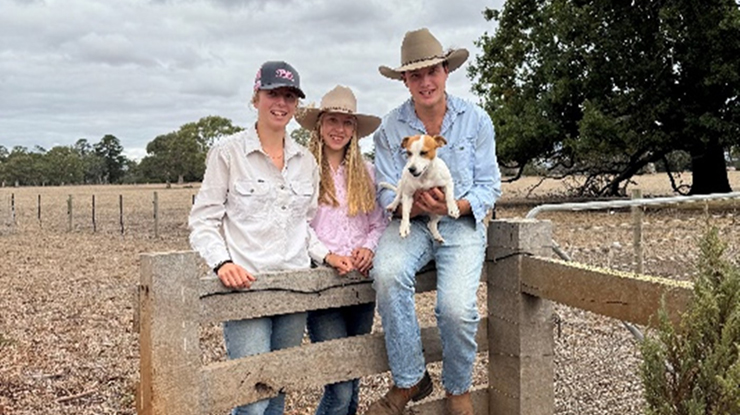 Paul and Megan Mould’s three children, Ava, Millie and Harry.
Paul and Megan Mould’s three children, Ava, Millie and Harry.
Raising resilient herds: prioritising nutrition, welfare and sustainability
Effective post-weaning management is essential to ensure optimal cattle growth, improve herd productivity and enhance financial viability.
Paul and Megan Mould, along with their children Ava, Millie and Harry, manage a spring-calving Angus and F1 Wagyu enterprise near Coleraine, Victoria. They have refined their approach to weaner nutrition and management to maximise efficiency and profitability.
Paul and Megan grew up north of Broken Hill and Port Augusta. The Moulds were managing the family farm ‘Emu Springs’ at Tintinara in SA before relocating to Victoria’s Western District around 10 years ago. They have since consistently sought opportunities to enhance their management practices.
Their participation in Meat & Livestock Australia’s (MLA) Producer Demonstration Site (PDS) project −‘Post-weaning management strategies for cattle herds’ (delivered by MacKillop Farm Management Group) has allowed them to trial new approaches, leading to tangible improvements in cattle performance, economic outcomes, and overall business resilience.
Enhancing post-weaning strategies
Participation in the project allowed the Moulds to refine post-weaning strategies by implementing structured nutritional planning, improved handling techniques and data-driven management decisions.
Key developments included:
- Comparative feeding trials: Two feeding systems were trialled – one group was fed hay and silage, while another was pasture-fed without supplementation. These trials demonstrated the value of strategically meeting nutritional requirements, reinforcing the importance of balanced feeding programs to optimise weight gains.
- Improving yard weaning practices: Adjustments in the yard weaning phase led to improved calf adaptability, reducing stress and enhancing feed efficiency.
- Incorporating minerals into the ration: The introduction of minerals (using Beachport Liquid Minerals) anecdotally contributed to better calf demeanour and enhanced feed transitions, supporting overall herd performance.
- Trialling summer crop integration: A trial with 70 Angus steers on 27ha of summer crop demonstrated the potential for alternative feed sources. While initial acclimation challenges resulted in approximately 50% of the feed being consumed before cattle fully benefited, future refinements aim to optimise utilisation through adjusted stocking rates and targeted sowing strategies.
- Advancing supplementary feeding approaches: The Moulds transitioned from pellets to crushed barley, ultimately adopting a Farmgate Stockfeeds grain mix. Imprint feeding proved highly beneficial, allowing easier adaptation to feeders, reducing transition times and ensuring more consistent feed uptake.
Economic impact and gross margin benefits
An assessment of financial outcomes following these refinements has demonstrated key economic advantages:
- lower feed costs while maintaining targeted growth rates
- healthier, more resilient weaners, leading to fewer animal health issues and improved overall herd wellbeing
- improved weight gain efficiencies, enhancing market readiness
By strategically meeting nutritional needs in the most cost-effective manner, the Moulds have strengthened their gross margin, demonstrating the importance of refined post-weaning strategies.
Diversification: Basalt Hills Beef & Lamb
Beyond their focus on production efficiency, the Moulds have embraced business diversification through the development of Basalt Hills Beef & Lamb − a premium farm-to-plate beef and lamb brand. The brand is run in conjunction with the Ross family from North Gums at Penshurst, who supply the lamb.
The venture is designed to provide greater control over farm gate prices, minimising exposure to market fluctuations while reinforcing financial sustainability through value-adding opportunities. Additionally, it supports succession planning in their business, ensuring long-term enterprise resilience. A key focus is bridging the gap between producers and consumers, fostering education and transparency around ethical farming practices.
The Moulds faced early production challenges, particularly due to drought conditions, which affected the consistency of their product. However, their initial product trials – including one 650kg steer and 12–15 lambs – produced exceptional quality meat, reinforcing confidence in their small-batch approach.
The feedback was highly positive, especially regarding the taste and tenderness. Consumer engagement has been a key focus, with social media marketing via Instagram driving direct sales and educational outreach.
Commitment to welfare
The Moulds are committed to high welfare standards, ensuring pasture-raised livestock wherever seasonally achievable and prioritising minimal stress throughout the supply chain.
By reducing carbon miles and shortening transport distances, the Moulds improve both sustainability and animal welfare while offering greater transparency, enabling consumers to understand exactly where their meat comes from.
As the business grows, developing a robust direct-to-consumer supply model remains a priority.
The Moulds have established retail partnerships with several businesses around the Western District, including Hamilton Hamper, Penshurst Store, Freshly Fed, and The Bunyip pub, expanding their reach.
Partnering with Arteka Farms for a market at The Roxborough in Hamilton has been a valuable local marketing strategy, providing exposure and direct engagement with consumers. This approach not only helps build brand recognition but also allows potential customers to sample individual cuts before committing to a full hamper.
With plans to repeat the collaboration, it presents a strong opportunity to continue fostering local connections and increasing consumer confidence in the product. Future plans include diversifying product offerings, incorporating catering boxes and surprise meat packs to better utilise lower value cuts, and investing in refrigerated transport to scale distribution efficiently.
|
Key takeaways
|
Many thanks to Jo Ward, Jo Ward Livestock Vet, for the contribution of this case study.



